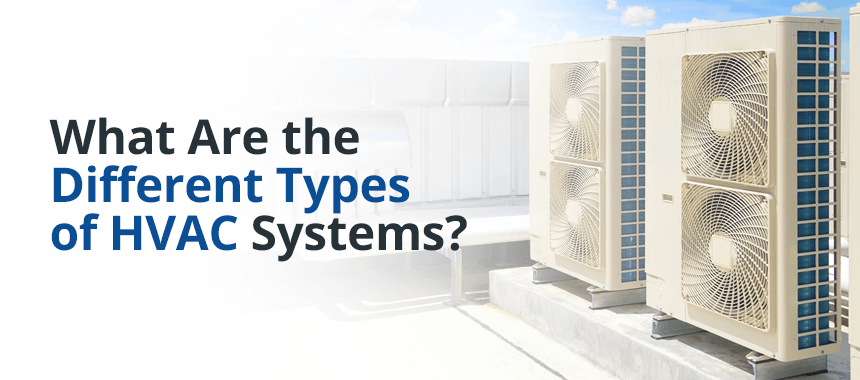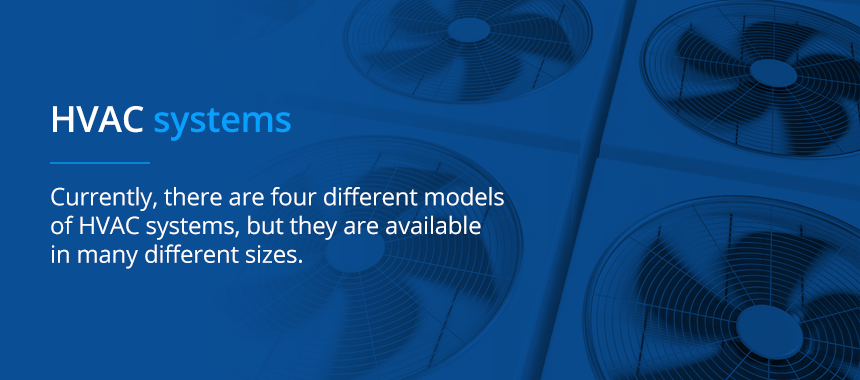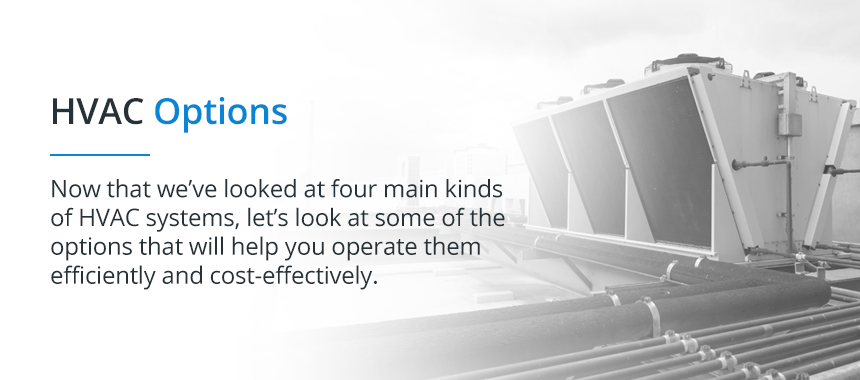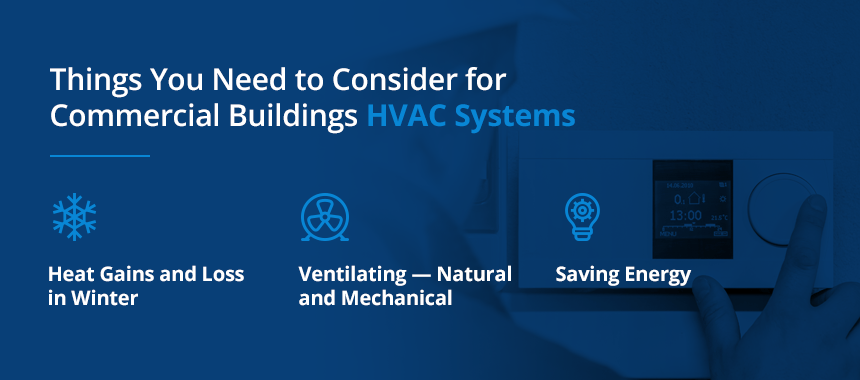
The options for heating or cooling your office or home are vast: hybrid systems, ductless systems, split systems, packed systems, etc. It’s important to choose the right one that will give you the best value and will provide the most efficient heating and cooling for the space in which the system will be used.
Along with the HVAC system, you need to consider issues like how much heat you will gain or lose in the winter, whether you want to use natural or mechanical ventilating and the best ways to save energy.
HVAC systems

Currently, there are four different models of HVAC systems, but they are available in many different sizes. The 4 basic categories of HVAC systems include split systems. Hybrid Heat System, Duct-Free or Ductless Air Conditioning and Heating Systems, and Packed Systems. Below is more information about each system:
- Split Systems
This is perhaps the best-known and most classic of the available HVAC systems. With the split model, components are placed both inside and outside a building. Unlike packed systems, which we will discuss more later, split systems offer more energy efficiency and lower operating costs.
The tricky part with a split system is the installation. It can often be quite complex and must be professionally installed by an expert. It’s also difficult to mix and match components of a split system. They normally require everything to be from the same manufacturer if you want the system to work at its best, and qualify for warranties, and rebates from utilities.
Normally, a split system HVAC unit will have:
- An outdoor component, or a condenser, such as an air conditioner or a heat pump.
- An indoor component that consists of an evaporator coil or fan, along with furnaces that convert refrigerant and help circulate air.
- A system of ducts that circulate air from the HVAC unit throughout your home or building.
- A thermostat — either programmable or non-programmable — that manages the system
- Accessories that help improve the quality, comfort, of the indoor air such as purifiers, air cleaners, UV lamps or humidifiers.
Learn More About Our HVAC Services
- Hybrid Heat Split System
This is an advanced version of the split system. Its main difference is that it has improved energy efficiency. If you decide to include a heat pump in a hybrid HVAC system, it will give the option of using electricity to power the HVAC unit above a typical gas or oil furnace. The most cost-effective hybrid split systems will include the following:
- A heat pump to cool or heat refrigerant.
- An evaporator coil and furnaces that work to convert refrigerant and circulate air.
- A furnace either oil or gas
- Ducts to take the warm or cool air throughout your home or your building.
- Accessories to improve indoor air quality.
- Duct-Free or Ductless Air Conditioning and Heating Systems
This is a great ultra-efficient HVAC. It is most popular use is in areas or places where conventional systems of ducts cannot be used. They are also ideal complements to use with HVAC systems that do use ducts if you need supplement or to expand your air conditioning and heating area. We use them to dehumidify and heat basements, to heat and cool the room over the garage, or to condition any hard to cool or heat part of the office or home.
These systems normally consist of an indoor wall-mounted unit connected to an outside compressor. Unlike duct systems, these units only need a small hole drilled in the wall. This makes them much less vulnerable to possible security problems or air leakage. They are also relatively quiet.
In most homes, about 20% of energy is wasted with a ducted system, so right away, using a ductless system makes your system more efficient. Also, since ductless systems use inverter-driven compressors, they react much better to the actual needs of the system and don’t shut off completely like a traditional HVAC unit — which can expend a lot of energy every time it starts up again. It also dehumidifies so you can feel much more comfortable at a higher temperature.
Duct-free systems contain the following components:
- An air conditioner or heat pump to cool or heat refrigerant.
- A compact fan coil.
- Wires and tubes to connect refrigerant from the outdoor unit to the fan coil.
- A thermostat to manage the system.
- Indoor air quality accessories to improve air quality before it is circulated throughout your home or building.
Ductless mini-split air conditioning systems are known to provide the following benefits to your home or commercial space:
- Excellent Efficiency – Ductless ACs boast high-efficiency ratings, and they utilize smaller equipment allowing them to use less energy.
- Ideal Installation – Because they don’t require ductwork, the installation is quicker. This decreases any “downtime” in your comfort!
- Awesome Air Quality – Each indoor unit filters out the air, helping to remove excess dust from the home. The lack of ductwork also reduces the amount of dust being circulated.
- Minimal Maintenance – Ductwork needs to be cleaned regularly, and sometimes needs to be repaired. Although filters still need to be changed for ductless ACs, there is no ductwork to clean or repair.
Overall a ductless mini-split AC system saves homeowners money thanks to the efficiency and smaller size of the system! If you’re looking to upgrade your air conditioning system – or, if you’ve found some rooms in your home could use a hand with keeping cool – contact us!
- Packed System for Heating and Air Conditioning
This is a solution for homes or offices that do not have enough indoor space for all the various components of a split system. Packed systems can be used in confined spaces, and everything comes together in one package. They can cool or heat an entire home or a one-room unit. They are also often the best choice to heat or to cool a very large space.
Packed systems are much easier to install than split systems. If your home or your office is too small for an air handler component to be installed inside, then a packed system is a real space saver. They can sit on your roof or on the side of your building or your home. A hvac technician can install it in a day or two, while a split system takes about a week. It’s also easier for the technician to maintain since all the components are in one place.
The disadvantage of a packed system is that they are outside and exposed to extreme weather. it is easier to damage. While packed systems are built to resist bad weather, they are not foolproof. You also need to make sure they are free of any leaves, standing water or debris. If the system is located on your roof, this adds an additional element of difficulty.
A packaged system will contain:
- The heat pump, or gas furnace, and air conditioner and the fan coil and evaporator reside in one unit
- An interface/thermostat on the front of the unit that will allow you to control the system.
- Optional indoor air quality accessories.
HVAC Options

Now that we’ve looked at four main kinds of HVAC systems, let’s look at some of the options that will help you operate them efficiently and cost-effectively:
- Single or Multistage
A single stage HVAC system either runs at full capacity, and so it is “on”, or it is not running at all, and so it is “off.” It only offers a single stage of cooling or heating output. Full blast or off.
Multistage HVAC systems have more than one stage. Most multistage systems offer two stages or two levels of output. An interface/thermostat will give you the option between a high setting or low setting. It will adjust automatically giving you an ultra-efficient system and better comfort. I
Multistage units can also come in three or four stages or variable speed.
- Zone Systems
HVAC zone systems use dampers in ductwork to control and regulate the air flow to different rooms in your home. A zoning system allows you to better control the temperature throughout various spaces. For instance, if you have a child who is away at college for a significant part of the year, you can set the zoning control for their room at a temperature that uses less energy since there is no current occupant.
If used with a programmable thermostat, a zoning system can help you save on your energy costs.
- Humidity Control
When controlling humidity in your home if you use an HVAC system, it’s important to select a system that is of the appropriate size for your home. If you select a unit that provides too much air-conditioning for your space, you will have problems with humidity. Too much air-conditioning is often what creates a “clammy” feeling you find with air conditioners that are not operating efficiently.
Too much humidity can lead to mold growth as well. The EPA recommends indoor humidity levels be kept below 60 percent — between 30 percent and 50 percent is considered to be ideal.
This is why it is important when buying any kind of air conditioning/heating system that the unit fits the space and is installed correctly.
Variable or multi-stage systems work best to control humidity when paired with the proper interface/thermostat.
Most Ductless Split Units have humidity settings and variable speed components built into them.
- Heating and Cooling Systems
Heating and cooling systems can come in the following formats:
- Gas furnaces
- Oil furnaces
- Air conditioners
- Heat pumps
- Geothermal heat pumps
- Solar-ready air conditioners and heat pumps
- Packed units
- Air handlers
- Boilers
- Mini-split systems
Things You Need to Consider for Commercial Buildings HVAC Systems

When you install HVAC systems in commercial buildings, there will probably be more regulations that you will need to follow, as well as certain energy concerns that may not arise as much in a private home.
Some of these issues include:
- Heat Gains and Loss in Winter
In winter, there are numerous ways that your building will gain heat. While the sun’s energy is weaker, it can still heat windows and walls. There are also internal ways to manufacture heat in the building, such as the lighting or the number of bodies in a room. Anyone who has been in a crowded auditorium, even in winter, knows how much heat can be generated by a room full of people.
How do you lose heat in winter? If your building envelope is leaking, windows are old and not properly sealed, warm air can leak out. Heat is also naturally lost through conduction of heat through walls or roofs or floors.
This is why it’s important that the HVAC system you choose for your building can deal with heat gains in the summer and heat losses in winter. This is where a multistage system can help. If your room is overheated, temperatures can gradually be reduced. If you’ve lost too much heat, temperatures can gradually be raised to where the room is comfortable again.
- Ventilating — Natural and Mechanical
Building codes specify how much outside air must be introduced at a specified rate, depending on its occupancy. The most common reason is for CO or Carbon Dioxide levels. People breathe air and it contains some oxygen, and we exhale some carbon dioxide. Occupancy method. Derives the ventilation rate from the number of people that will occupy the space at any given time. Example: For an office, the recommended ventilation rate is 20 cfm per person. The occupancy of a general office is one person per 80 to 150 sq. ft. bathroom, kitchens, special work areas, etc. all have special regulations.
Natural ventilation is pretty straightforward. It means you do not have a controlled process for your building. Basically, you ventilate your building by opening your windows or your doors. While natural ventilation is probably preferable to mechanical ventilation, it is difficult to use in a commercial office building.
Why? Occupants of commercial buildings often need to worry about security or privacy. Dust and noise concerns that come along with open doors and windows are also a problem, and there is the issue of energy loss as well. If you’re running an air conditioning system and have open doors and windows you’re basically “cooling the outside.”
Natural ventilation is also difficult to control. You can’t order up a breeze to cool your space or take the old air out and bring in some new fresh air. Natural ventilation also does not help the building’s envelope. What do we mean by the building’s envelope? In cold winter conditions, warm moist indoor air can lead to moisture issues in upper wall and attic spaces. In summer, hot humid air can create condensation in wall cavities. Mold can thrive in either of these conditions, which can affect the building’s longevity and durability.
Mechanical ventilation overcomes many of the shortfalls. Mechanical ventilation will exhaust moist air from areas like bathrooms or kitchen areas to the outdoors and also help balance the amount of fresh air rooms receive. This gives building owners more control over ventilation, regardless of weather conditions or the season of the year. It also allows owners of commercial buildings to better meet fresh air requirements mandated by health officials.
- Saving Energy
When you use smart HVAC practices in a commercial building, you not only save energy, but you can save money as well.
How do you do it? Here are a few tips:
- Perform regular maintenance. If you keep a regular maintenance schedule, you will not only make sure your HVAC system operates properly, but you will spot problems sooner.
- Fix problems right away. If your HVAC unit is using more energy than it should, fix it right away. You may want to put it off because you’re busy with other things, but it’s like throwing money out the window.
- Use programmable thermostats. This will better allow you to control the cool or hot air that is delivered to each area of your building.
- Do an energy audit. It’s hard to improve energy costs if you don’t know what the problem areas are. Take a look at your energy costs over the past two or three years. Are there energy spikes that can’t be explained by the change of seasons? Can you spot signs that your system is not working efficiently as it should? The more you know about the way your building consumes energy, the better you’ll be able to control it.
- Look for energy-wasting practices. Does someone bring in a space heater because the room is too cold? Are windows open when the heating system is on because it’s too hot in the space? Smart owners will have somebody do regular “patrols” of their office area looking for ways that energy is being wasted. It will also help you to more quickly solve the problems that created this waste of energy.
- Educate people. Your employees are your first line of defense against wasted energy. Let them know about the best ways to conserve energy. Sometimes they may not be aware that their practices are wasting energy and are happy to change it once they have the proper information.
Let Leggett Help You Find the Best HVAC System for Your Home or Building

When you need to install an HVAC system in your home or building, or if you want to make additions, improvements or repairs to an existing system, contact us at Leggett. A family-owned business in operation since 1966, we can help give you expert advice on the best system to choose and then provide you with an excellent professional installation. We can also perform regular maintenance on your HVAC system so that it is always operating at peak efficiency.
Did you know that old, outdated AC systems…
- Cost you more to run than newer units?
The efficiency of air conditioning equipment degrades over time, resulting in you spending more money on annual energy costs. The older your equipment, the more energy dollars you’re likely wasting! - Cost you more to maintain than newer units? – Older equipment tends to require more frequent repairs due to years of normal wear and tear, which racks up the cost to keep it running year after year.
- Utilize refrigerant that is harmful to the planet? – Air conditioning systems that were manufactured before the year 2010 utilize a refrigerant that has been phased-out by the EPA as of January 1 of this year. This refrigerant, known as R-22, was found to be harmful to our environment and was promptly replaced by a more environmentally friendly refrigerant known as R-410A.
Parting might be sweet sorrow, but once you realize the savings you could earn from upgrading you might not feel as bad for getting rid of a decades-old AC system!
Don’t miss out on the benefits of upgrading. Give us a call at 717-737-4562 or contact us online to learn more about the products we have available, and the air conditioning services you can take advantage of!





Comments
Helpful information. Fortunate me I found your website accidentally, and I’m stunned why this accident did not took
place earlier! I bookmarked it.
Also visit my blog: vpn coupon 2024
This is a topic that’s near to my heart… Cheers!
Exactly where are your contact details though?
My homepage: vpn coupon 2024
Magnificent beat ! I wish to apprentice while you amend your site,
how can i subscribe for a blog website? The account helped me a
acceptable deal. I had been a little bit acquainted of this your broadcast offered bright clear concept
Look at my homepage :: vpn coupon 2024
Wow, this article is good, my sister is analyzing such
things, therefore I am going to convey her.
My web page vpn special code
I have read so many posts about the blogger lovers however this paragraph
is in fact a pleasant article, keep it up.
My site … vpn coupon 2024
Wow, awesome blog format! How lengthy have you been running
a blog for? you made running a blog look
easy. The entire glance of your website is great, as well as the content!
You can see similar here sklep internetowy